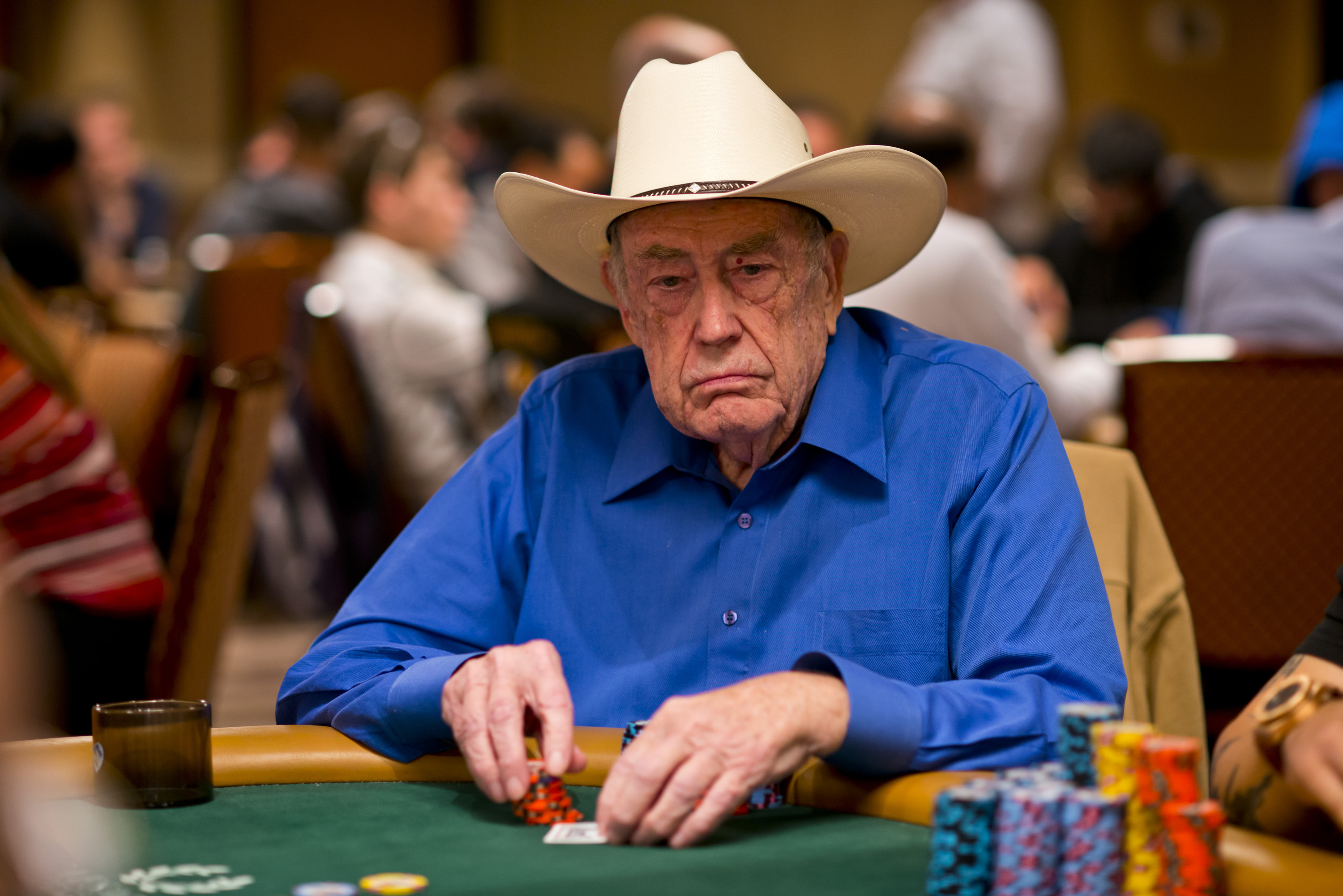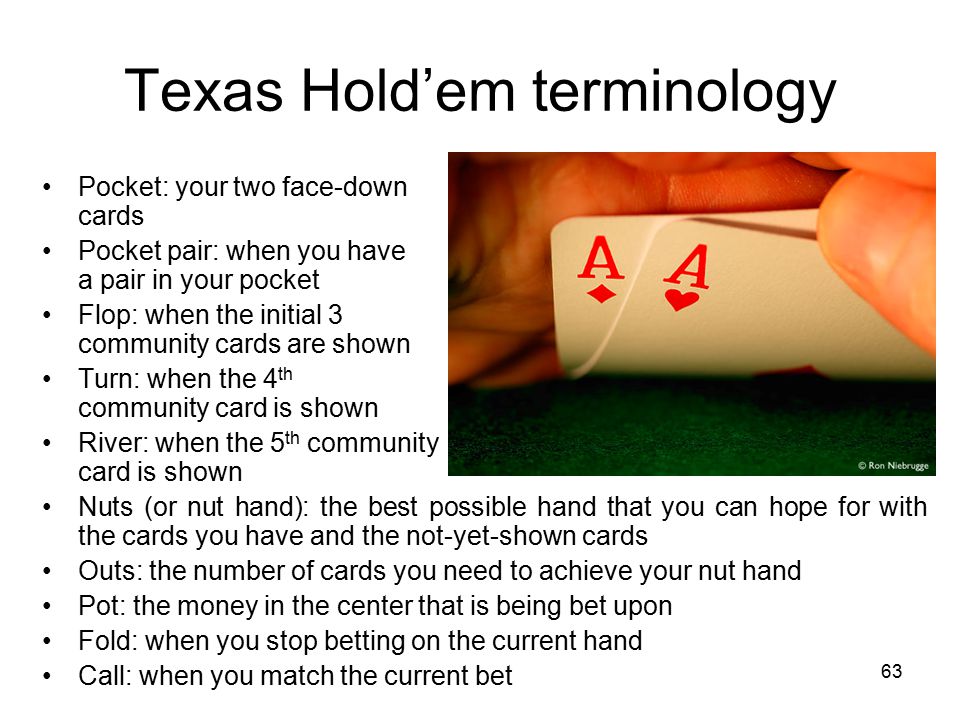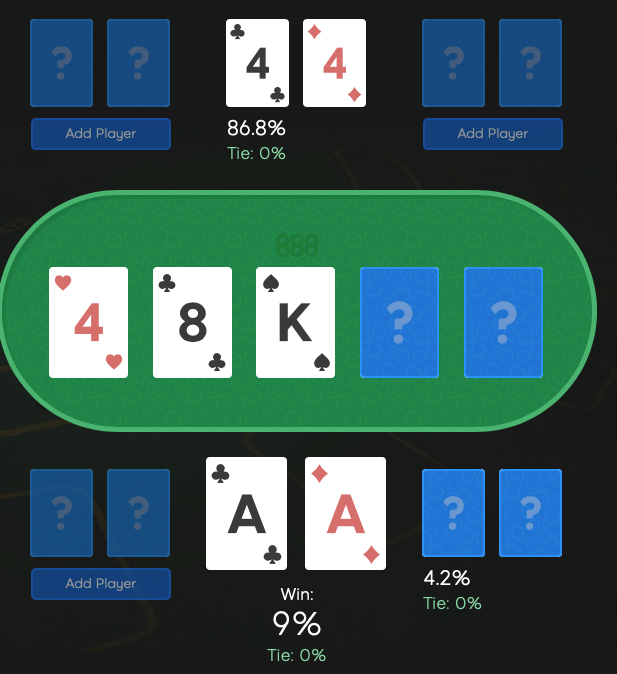Texas Holdem Vocabulary Terms
Texas holdem poker glossary part 1 (a - b) $5 + $0.50 Used in buy-in tournaments, in this case the $5 is the amount that you contribute to the prize pot and $0.50 is the fee charged by the site, so if there were 20 players the total prize pot would be $100, divided up between the top three or four. Poker terms A to G, meaning of words: Terminology, Jargon, Slang, Vocabulary. A Aces Wired - (Also, Bullets) Two Aces back-to-back (in the hole). Act - When its your turn to act, you either check, call, fold, open bet, or raise. Action - A wager or bet of any kind. The placing of money into the pot (e.g. Many bets and raises is described as 'a lot of action').
Exercise: How to play Texas Hold'em poker
In the following conversation between two friends (Peter and Juan), Peter is explaining to Juan how to play Texas Hold'em in English.
From the context, try to guess what the meaning of the words/phrases in bold are. Then do the quiz at the end to check if you are right.
Juan:'I understand the basic rules of poker, the player with the highest hand, the best five cards wins the game, but I am bit confused about the type of poker called Texas Hold'em. When I've played poker before with friends, each player had five private cards that only the player could see. But from what I've seen with Texas Hold'em, each player only has two private cards and there are five shared card in the middle of the table that are face up and all the players can use them to get the best hand/five cards.'
Peter:'Like any type of poker, the player with the best hand or five cards wins. With Texas Hold'em, the players use their two private cards and any three of the five shared cards (which are also called community cards) to make their hand/five cards. '
Juan:'So how do you play it?'
Peter:'With Texas Hold'em poker, each game starts with two of the players putting their chips/money into the pot before they are dealt their two cards and seeing if they have the possibility of having a good hand. This is called to start the pot.'
Juan:'It doesn't seem fair that the other players can see their cards before deciding if they want to play in the game and putting their chips/money into the pot.'
Peter:'It is fair because the players who have to make this blind bet (which is called 'blind' because they don't know how good their hand or cards could be) change every game. It rotates round all the players in a clockwise direction (the direction a clock moves) each game.'
Juan:'So, how do you know or remember whose turn it is to make the blind bets?'
Peter:'In a casino, there are three different plastic discs/buttons which are placed/put on the poker table in front of three different players sat next to each other (one button/disc placed in front of each player). These discs/buttons each move to the next player on the left at the start of every new game.
The first disc is called the dealer button (a white disc with the word 'dealer' written on it). By the way, the player with the dealer button doesn't deal the cards in a game in a casino, the dealer does. The player with this button goes last in each round.
The two players who sit to the left of the player with the dealer button are the ones who have to make the blind bets. The first player to the left of the player with the dealer button has a plastic disc/button called the small blind button (a purple disc with the word 'small blind' written on it) and the player sat to the left of him or her has a plastic disc/button called the big blind button (a yellow disc with the word 'big blind' written on it).'
Juan:'So, how much money do the two players making the blind bets have to put into the pot?'
Peter:'The big blind of a Texas Hold'em game is the minimum bet, which is the lowest amount of money that a player can put into the pot during any round of the poker game. The small blind is half of this minimum bet. So, if the minimum bet is $4, the player who has the big blind button has to put $4 into the pot and the player with the small blind button has to put $2 into the pot before they receive their cards.'
Juan:'So, what happens next?'
Peter:'The first round of the poker game starts when the blind bets are put into the pot. After the blind bets are given, all the players are given/dealt their two hole cards to look at by the dealer. These are the two private cards that the players receives face down and hide from the other players.'
Juan:'I didn't know they were called hole cards. So what is the name for the cards which are dealt face up in the the middle of the table which all the players can use? Are they called shared cards?'
Peter:'They can be called shared cards, but more commonly they are called community cards. Community cards are the cards which are dealt face up in the middle of the table and are used by all the players to make their hand (best 5 cards) in combination with their 2 private or hole cards at the end of the game.'
Juan:'One of the things that I don't understand about poker is how does the casino or online casino make money from poker. All the money/chips which are gambled in a poker game are won by one of the players. So how can a casino earn money from poker?'
Peter:'The casino do make money from poker games (they wouldn't do it if they didn't). They normally make money by taking a small percentage of the money/chips that have been gambled by all the players in each game. This is called the rake or the pot rake. The rake is normally between 5 and 10 percent of the pot (the total amount of money/chips which have been gambled in a game). So the winner's winnings will be total amount gambled in a game minus the rake the casino takes.'
Juan:'So, a rake is used in every type of casino poker game?'
Peter:'In most poker games, yes. But if you play in a poker tournament, the casino normally doesn't take a rake from each game. They often make their money by charging all the players an entrance fee at the beginning of the tournament. This is called a tournament fee and the amount a player has to pay to the casino depends on the type of tournament (the tournament fee can range from $5 to thousands of dollars).'
Exercise: How to play Texas Hold'em poker continued
In the following conversation between two friends (Peter and Juan), Peter continue to explain to Juan how to play Texas Hold'em in English.
From the context, try to guess what the meaning of the words/phrases in bold are. Then do the quiz at the end to check if you are right.
Juan:'So in the first round of game of Texas Hold'em. After the two players have had to put blind bets (bets that two of the players have to make before any of the players receive their first two cards). What do the rest of the players do when they are all dealt their two private/hole cards?'
Peter:'All the players have to decide if they want to continue in the game by putting money into the pot or if they want to leave the game, which is called to fold. Because two of the players have have put money into the pot with the blind bets, the rest of the players have to match the amount put in by the person who has the big blind button in front of them if they want to continue playing (including the player with the small blind button, who has to double the amount they put in at the start of the game).'

Texas Holdem Vocabulary Terms Definitions

Juan:'Does a round happen each time new cards are given to the players or shown in the middle of the table face up?'
Peter:'Yes. A round is when the players can bet their money or chips in a game. In Texas Hold'em the first round is normally called the pre-flop. It begins when the players are given their two hole or private cards.
The second round begins when the dealer deals the three shared or community cards in the middle of the table. When the first three community cards are dealt. This second round is called the flop in Texas Holdem.
The third round (which is called the turn) begins when the dealer adds a fourth community card in the middle of the table. The last round (which is called the river) begins when the dealer deals the fifth and last community card on the table.
After all the players left in the game have put the same amount of chips/money into the pot in 'the river' round, the round ends and they then have to show their cards to see who has won the game.'
Juan:'So, I know how the first round starts, after the two players to the left of the player with the dealer button put the blind bets into the pot and all the players receive their first two cards. But which player starts the second round?'
Peter:'In all the rounds except the first it is the first player who is still playing and is sat to the left of the player with the dealer button who starts the round. In the first round, it is player sat to the left of the player with the big blind button who starts the round.'
Juan:'So, does the player beginning a round always have to put chips/money into the pot if they want to continue playing?'
Peter:'No, they don't. If they don't want to put chips/money into the pot, they say check and then it goes to the next player. If that player also doesn't want to put chips/money into the pot, they can also say check and then it would go to the next player. But if that player thinks he has a good hand/cards they can decide to put chips/money into the pot. The first time in a round (except in the first round) that a player puts money into the pot is called a bet.'

Juan:'So if a player makes a bet of $20. What does the next player have to do? Can they say check and not put any chips/money into the pot?'
Peter:'No. When somebody has already put chips/money into the pot, they can't check, they also have to gamble chips/money or fold/leave the game.
The next player has three options. The first option is that they can fold/leave the game. The second option is to put the same value of money/chips into the pot that the last player has put into the pot. This is called to call. So if the last player put $20 in, when you call you also put $20 in.
The last option is to put more chips/money into the pot than the last player. This is called to raise. So if the last player put $20 in, and you raise by $10, you put $30 in.'
Juan:'So when does a round end?'
Peter:'A round ends when all the players who haven't folded and are still playing have put in the same amount/value of chips/money into the pot. So in a game of 4 players, if player 1 checks, player 2 folds, but player 3 makes a bet of $30 and player 4 then raises by $10 the round continues and it goes back to player 1 again. If player 1 wants to continue playing, he/she has to match the $40 that player 4 put in and call (put $40 into the pot).
It then continues to player 3 again. If player 3 wants to continue playing, he/she has to match the $40 of player 4 by calling and adding another €10 to the pot. The round will then finish because all the remaining players have each put $40 into the pot.'
Juan:'A little bit confusing, but it makes sense. I've seen people in the movies playing poker and they don't say call or raise or bet, but say all-in. What does that mean?'
Peter:'It's very common in films with poker games. The phrase all-in means that a player in a round puts all of his or her chips they have on the table in front of them (called his or her 'table stakes') into the pot.'
Juan:'Ok, but what happens if one of the players has put $120 into the pot in a round and one of the other players only has $100 of chips on the table. They would have to fold/leave the game in that round because they don't have the chips/money to match what has been put into the pot in that round?'
Peter:'No they don't have to fold. If the player has a good hand and thinks that they could win the game, they could go all-in in the round.'
Juan:'But you said that all players have to put the same amount of money into the pot to continue playing in the game? If one of the players has put $120 into the pot and one of the other players has gone all-in and only put $100 in, it doesn't seem fair to the player who has put the extra $20 in!'
Peter:'In that situation, if these are the only two players left in the game, the player who has put $20 extra into the pot, removes it and then the dealer deals the remaining community cards and then each player shows their hands to the dealer and to the other players to see who has won.'
Juan:'But what happens if there are more than two players left when somebody goes all-in? Do all the players have to remove the extra chips/money they have put into the pot?'
Texas Holdem Terminology
Peter:'It gets a little complicated now. If there are more than two players left in a game when one of the players goes all-in, the chips/money is separated into two different pots (the main pot and the side pot) so the poker game can continue if the other players want to put more chips/money into the game.
For example, imagine there are three players left in a poker game. At the start of the third round, player 1 bets $50, player 2 only has $40 left, so he goes all-in with his/her $40. Player 3 raises by €10, so puts $60 into the pot. The round returns to player 1, who calls, so matches the $60 of player 3 by adding $10 to his/her original $50.
To make it fair for all the players, $40 from each player is put into what is called the main pot. All three players could win this main pot. The extra money ($20 each) which has been put into the game by players 1 and 3 is put into another pot which can only be won by them two (not player 2). This is called a side pot and this is where all the chips/money will be placed in the next round until the game finishes.'
Juan:'So when all three players show their cards at the end of the game, which is called the showdown, if player 1 has three number 7s, player 2 has four Queens and player 3 has two number 10s. Player 2 will win the chips/money in the main pot, but who wins the chips/money in the side pot?'
Peter:'Player 1 will win the chips/money in the side pot because his hand is better than Player 3's hand.'
Juan:'That makes sense.'



